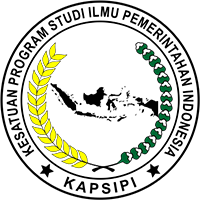Relasi Korupsi Politik dengan Perilaku Masyarakat dalam Pilkada Riau
DOI:
https://doi.org/10.35967/njip.v22i2.639Kata Kunci:
Korupsi Politik, Perilaku Masyarakat, Kultural, PILKADAAbstrak
Provinsi Riau merupakan daerah yang memiliki tingkat korupsi yang tinggi dikalangan kepala daerahnya di Indonesia. Selain dari tingkat korupsi yang tinggi, perilaku masyarakat juga menujukkan kecendrungan perilaku transaksional dengan meminta imbalan, bantuan, oleh-oleh kepada kandidat-kandidat dalam proses pilkada. Begitupun elit dan masyarakat, seolah menyemai suburnya korupsi, dengan cara meminta sumbangan dan berbagai bentuk materi dan jasa kepada kandidat sehingga kandidat menjadi berbiaya tinggi dalam proses pilkada. Penelitian ini menggunakan perspektif kultural dalam menganalisis fenomena korupsi. Tujuan penelitian ini adalah untuk menjelaskan bagaimana hubungan perilaku masyarakat Riau dalam pilkada dengan perilaku korupsi kepala daerah. Dengan metode kualitatif, teknik pengumpulan data melalui indept interview, dan pemilihan informal melalui purposive sampling maka diperoleh temuan penelitian bahwa dalam proses pilkada Gubernur Riau, terdapat perilaku masyarakat, tokoh dan elit yang cendrung transaksional dengan berusaha meminta berbagai macam imbalan seperti uang, barang, jasa dan fasilitas kepada kandidat dalam proses pilkada. Perilaku demikian sudah jamak terjadi di Riau bahkan cendrung “berlebihan” sehingga hal ini berdampak kepada beban sosial dan beban tingginya biaya politik. Hal ini kemudian berimplikasi terhadap kencendrungan perilaku koruptif kepala daerah sebagaimana ditunjukkan oleh kasus terdakwa tiga Gubernur Riau. Penelitian ini menyimpulkan bahwa terdapat relasi perilaku masyarakat dan elit yang sering meminta uang, barang, jasa, bantuan dan fasilitas kepada calon kepala daerah atau kepala daerah dengan tingginya perilaku korupsi kepala daerah di Riau.
Unduhan
Referensi
ACLC KPK. (2023). Tiga kasus korupsi dengan kerugian negara terbesar di Indonesia. Retrieved from ACLC KPK. https://aclc.kpk.go.id/aksi-informasi/Eksplorasi/20231120-tiga-kasus-korupsi-dengan-kerugian-negara-terbesar-di-indonesia
Adlin, & Handoko, T. (2018). Penguatan perilaku anti korupsi di lingkungan birokrasi Pemerintah Provinsi Riau. Jurnal Ilmu Pemerintahan Nakhoda, 17(29), 46–55. https://doi.org/10.35967/jipn.v17i29.7058
Agustino, L. (2014). Politik lokal dan otonomi daerah. Bandung: Alfabeta.
Agustino, L., Hikmawan, M. D., & Silas, J. (2023). Regional head elections, high-cost politics, and corruption in Indonesia. Otoritas: Jurnal Ilmu Pemerintahan, 13(1), 44–59. https://doi.org/10.26618/ojip.v13i1.8438
Alatas, S. H. (1987). Korupsi: Sifat, sebab dan fungsi. Jakarta: LP3ES.
Almond, G. A., & Verba, S. (1990). Budaya politik, tingkah laku politik dan demokrasi di lima negara. Jakarta: Bumi Aksara.
Anjari, W. (2020). Penerapan pidana mati terhadap terpidana kasus korupsi. Masalah-Masalah Hukum, 49(4), 432–442. https://doi.org/10.14710/mmh.49.4.2020.432-442
Asmara, C. J. (2018). Edukasi politik dalam pelaksanaan Pemilihan Kepala Daerah (PILKADA) langsung Kabupaten Kampar Provinsi Riau tahun 2017. Jurnal Ilmu Pemerintahan Nakhoda, 17(30), 69–77. https://doi.org/10.35967/jipn.v17i30.7060
Aspinall, E., & Sukmajati, M. (Eds.). (2015). Politik uang di Indonesia patronase dan kientelisme di pemilu legislatif 2014. PolGov.
Azwar, & Subekan, A. (2022). Does democracy reduce corruption in Indonesia? Jurnal Ilmu Sosial Dan Ilmu Politik, 25(3), 195–208. https://doi.org/10.22146/jsp.56886
Fauzi, G. (2014). Pengaruh pelaksanaan pemilihan kepala daerah langsung terhadap korupsi di Indonesia. Disertasi Doktoral tidak dipublikasikan. Institut Pemerintahan Dalam Negeri.
Ganie-Rochman, M., & Achwan, R. (2016). Corruption in Indonesia’s Emerging Democracy. Journal of Developing Societies, 32(2), 159–177. https://doi.org/10.1177/0169796X15625246
Ganie-Rohman, M., & Achwan, R. (2015). Sosiologi korupsi, isu konsep dan perdebatan. Jakarta: UI Press.
Hasanuddin, Marta, A., & Asrida, W. (2021). Menilai kualitas pilkada dalam era pandemi. Nakhoda: Jurnal Ilmu Pemerintahan, 20(1), 59–67. https://doi.org/10.35967/njip.v20i1.169
Henderson, J. V., & Kuncoro, A. (2004). Corruption in Indonesia. In NBER Working Paper Series (Vol. 10764). Cambridge, MA. https://doi.org/10.3386/w10674
Heywood, P. M. (Ed.). (2014). Routledge handbook of political corruption. Britania Raya: Taylor & Francis.
Ibrahim, R., Yusoff, M. A., & Koling, H. M. (2018). Patterns and causes of corruption among government officials in Indonesia. Journal of Public Administration and Business, 1(1), 74–91.
Indonesia Corruption Watch. (2013). Riau masuk 10 besar provinsi terkorup. Retrieved from Indonesia Corruption Watch. https://antikorupsi.org/id/article/riau-masuk-10-besar-provinsi-terkorup
Koentjaraningrat. (2009). Pengantar ilmu antropologi. Jakarta: Rineka Cipta.
Kusnandar, V. B. (2022). Biaya politik tinggi, banyak kepala daerah terjerat kasus korupsi. https://databoks.katadata.co.id/datapublish/2022/09/19/biaya-politik-tinggi-banyak-kepala-daerah-terjerat-kasus-korupsi
Lewis, B. D., & Hendrawan, A. (2019). The impact of majority coalitions on local government spending, service delivery, and corruption in Indonesia. European Journal of Political Economy, 58, 178–191. https://doi.org/10.1016/j.ejpoleco.2018.11.002
Misra, F., Sudarmoko, Apriwan, Hakim, A., Ichsan Kabullah, M., & Rahman, F. (2021). Kontekstualisasi Pilkada Riau: Sosiokultural, relasi klientalistik dan indikasi politik uang. Integritas: Jurnal Antikorupsi, 7(1), 43–56. https://doi.org/10.32697/integritas.v7i1.724
Noor, F., Siregar, S. N., Hanafi, R. I., & Sepriwasa, D. (2021). The Implementation of direct local election (Pilkada) and money politics tendencies: The current Indonesian case. Politik Indonesia: Indonesian Political Science Review, 6(2), 227–246. https://doi.org/10.15294/ipsr.v6i2.31438
Nye, J. S. (2007). Corruption and political development: A cost-benefit analysis. In A. Heidenheimer & J. Michael (Eds.), Political corruption: Concepts and contexts. New Jersey: Transaction publisher.
Rahayuningtyas, D. P. A., & Setyaningrum, D. (2017). Pengaruh tata kelola dan e-government terhadap korupsi. EKUITAS (Jurnal Ekonomi Dan Keuangan), 1(4), 431–450. https://doi.org/10.24034/j25485024.y2017.v1.i4.2597
Republik Indonesia. (1999). Undang-Undang No.31 tahun 1999 tentang pemberantasan tindak pidana korupsi.
Ritzer, G. (2012). Teori sosiologi: Dari sosiologi klasik sampai perkembangan terakhir postmodern. Yogyakarta: Pustaka Pelajar.
Ruslan, M. (2017). Politik anti korupsi di Indonesia: Gradualitas dan ambiguitas. Depok: LP3ES.
Sandi, S. A., Gunawan, G., & Ramdani, Y. (2019). Tinjauan kualitatif pengaruh laju pertumbuhan gross domestic product terhadap korupsi. Prosiding Matematika, 5(2), 10–17. https://doi.org/10.29313/.v0i0.17394
Sissener, T. K. (2001). Anthropological perspectives on corruption (CMI Working Paper No.5). http://hdl.handle.net/11250/2435980
Sugiyono. (2012). Memahami penelitian kualitatif. Bandung: Alfabeta.
Syarief, R. A. O., & Prastiyo, D. (2018). Korupsi kolektif (korupsi berjamaah) di Indonesia: Antara faktor penyebab dan penegakan hukum. Jurnal Hukum Respublica, 18(1), 1–13. https://doi.org/10.31849/respublica.v18i1.3947
Syarif, L. M., & Faisal. (2019). Addressing the root of political corruption in Indonesia. Integritas: Jurnal Antikorupsi, 5(2), 191–198. https://doi.org/10.32697/integritas.v5i2.487
Syukur, M. (2022, April 20). Baru bebas, mantan Gubernur Riau Annas Maamun bakal kembali diadili. https://www.liputan6.com/regional/read/4943138/baru-bebas-mantan-gubernur-riau-annas-maamun-bakal-kembali-diadili
Utama, D. A. (2019, April 10). KPK sebut Aceh, Sumut, Riau, Banten, Papua dan Papua Barat juaranya korupsi. https://www.merdeka.com/peristiwa/kpk-sebut-aceh-sumut-riau-banten-papua-dan-papua-barat-juaranya-korupsi.html
Unduhan
Diterbitkan
Cara Mengutip
Terbitan
Bagian
Lisensi
Hak Cipta (c) 2023 Penulis

Artikel ini berlisensiCreative Commons Attribution-NonCommercial-ShareAlike 4.0 International License.





